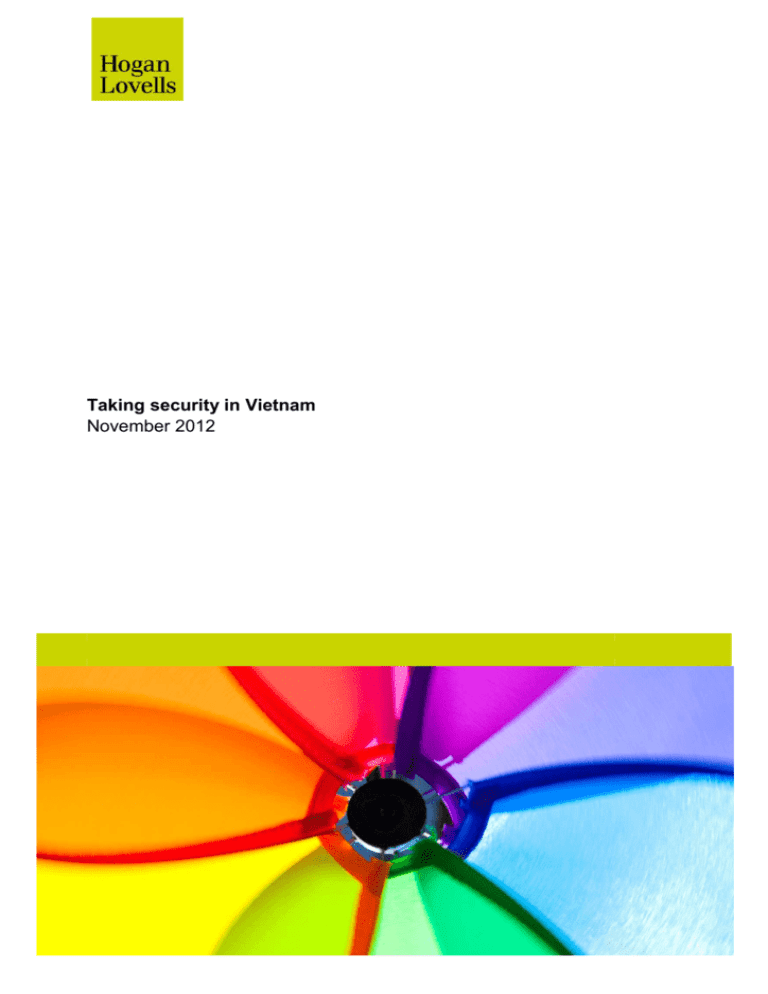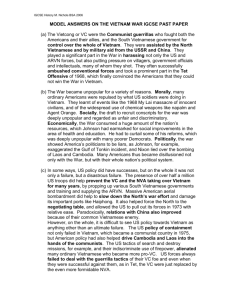
Taking security in Vietnam
November 2012
Further information
If you would like further information on any aspect of taking security in Vietnam please contact a person mentioned below or the
person with whom you usually deal.
Contact
James Harris
T +65 63022 552
james.harris@hoganlovells.com
Sean Conaty
T+65 6302 2440
sean.conaty@hoganlovells.com
Stanley Boots
T +84 43946 1146
stanley.boots@hoganlovells.com
Christian Schaefer
T +84 83822 6198
christian.schaefer@hoganlovells.com
November 2012
This note is written as a general guide only. It should not be relied upon as a substitute for specific legal advice.
1
Taking security in Vietnam
INTRODUCTION
Pledge
This note provides a preliminary overview of the types of
security available under Vietnamese law.
In contrast to a mortgage, the pledgor is required to pass
possession of the pledged property to the pledgee or a third
party nominated by the pledgee for the term of the pledge. As
possession is transferred to the pledgee this may, as a
practical matter, make enforcement over the secured assets
an easier process. .
LEGAL INSTRUMENTS OF VIETNAM GOVERNING
SECURED TRANSACTIONS
In Vietnam secured transactions are primarily governed by the
following legal instruments:
Law No. 33/2005/QH11 of the National Assembly dated 14
June 2005 adopting the Civil Code of Vietnam (in effect
from 1 January 2006) ("Civil Code");
Decree No. 163/2006/ND-CP of the Government dated 29
December 2006 on security transactions as amended by
Decree No. 83/2010/ND-CP dated 23 July 2010 and
Decree No. 11/2012/ND-CP dated 22 February 2012
("Decree 163");
Circular No. 05/2011/TT-BTP of the Ministry of Justice
dated 16 February 2011 guiding the registration of and
provision of information about security transactions and
contracts, and notification of assets attached to enforce a
judgement directly, by post, fax or email at registration
centres of the National Office for Registration of Security
Transactions under the Ministry of Justice ("Circular 05")
SECURED TRANSACTIONS IN GENERAL
Under Vietnamese law there are only two types of classic
security which entitle the beneficiary to sell the object of the
security and satisfy its claims by applying the proceeds of the
sale: (i) a mortgage of property and (ii) a pledge of property.
Other types of security used in Vietnam include performance
bonds, security deposits and escrow deposits. In the context
of Vietnam, guarantees are also referred to as a type of
security.
Mortgage
The key characteristic of a mortgage in Vietnam is that the
mortgagor is not required to part with possession of the
mortgaged property; however, the parties may agree that a
third party shall hold possession of the mortgaged property
during the term of the mortgage. A mortgage can be granted
over “revolving” property (e.g. security over interchangeable
stock that can be replaced from time to time) and may also be
granted over certain future property, although the definition of
“future property” has recently been tightened in Decree
11/2012/ND-CP dated 22 February 2012 amending Decree
163 (“Decree 11”). Only a mortgage may be granted over
land or assets attached to land.
A pledge may also be granted over “revolving” collateral (e.g.
interchangeable stock that can be replaced from time to time)
and may also be granted over certain goods to be created in
the future.
A pledge may not be granted over land or assets attached to
land.
Third party security
Security may also be provided by a third party for the
obligations owed by the borrower or debtor and it is common
in Vietnam to require guarantees or other forms of security
from shareholders, holding companies or related group
companies.
Registration requirements
Security over most types of assets may be registered with the
National Registration Agency for Security Transactions
(“NRAST”), established under the Ministry of Justice. Security
over land may be registered with the relevant Department of
Natural Resources and Environment (“DONRE”) at its Land
Use Rights Registration Centre. Other types of assets with
their own central register of ownership may have their own
registration requirements (e.g. the registration of mortgages
for ships with the Vietnam National Maritime Bureau and with
the Civil Aviation Authority for aircraft). For certain types of
security e.g. security over land use rights, registration is
necessary for the security to be legally binding and effective.
However, other types of security do not need to be registered
in order to be effective between the security provider and the
secured party but must be registered in order to be legally
binding vis-à-vis third parties (including other creditors of the
mortgagor) and in order to confer priority.
A TYPICAL SECURITY PACKAGE
Vietnamese law does not recognise a form of security
equivalent to an English law style fixed and floating charge. It
is therefore necessary to take security over different classes
of assets separately. A typical comprehensive onshore
security package may include the following:
2
Land use rights and assets attached to land
A mortgage may be taken over these assets. Land use rights
and assets attached to land may only be secured in favour of
onshore banks (i.e., locally incorporated banks. This gives
rise to complications in offshore financings. Solutions are
available to overcome this limitation but their validity has not
been confirmed by Vietnamese courts. Structuring an offshore
financing to include security over land use rights and assets
attached to land must therefore be planned carefully with your
legal advisor.
Note that in BOT and PPP style project financings further
complications arise due to the requirement that in order to
effectively grant a mortgage the mortgagor must have paid
land rent (if the land is leased by the mortgagor) or land use
fees (if the land has been allocated to the mortgagor, which
applies to Vietnamese enterprises only) upfront for the use of
the land over the entire term of the land use right. Under
Vietnamese BOT and PPP legislation project companies are
exempt from the payment of land rent/land use fees – casting
uncertainty on their ability to grant security over such assets.
are listed on a stock exchange in Vietnam (the Ho Chi Minh
City Stock Exchange or the Hanoi Stock Exchange). Before a
pledge over listed securities becomes valid, the custodian that
maintains the securities accounts on behalf of the securities
owner with the Vietnam Securities Depository (“VSD”) is
required to instruct the VSD to transfer the pledged shares
into a securities pledge account from which the pledged
shares cannot be traded.
Mortgage of receivables
Vietnamese law permits mortgages of certain contractual
receivables (including the right to reclaim debts, contractual
property rights, and rights from insurance policies). Generally
security should be taken by way of a mortgage. There is some
uncertainty under Vietnamese law over the validity of security
over other types of contractual rights and receivables and a
security assignment of certain contractual rights and noncontractual claims may be more appropriate in certain cases.
Intellectual property
Physical movable assets
Security should be taken by way of mortgage if the mortgagor
is to continue to use the assets or by pledge if possession of
the secured property is transferred to the secured party.
IP rights are generally able to be used as collateral, although
certain limitations may apply to moral rights of copyrights
holders that may not be transferred. Security granted over
assets arising from copyright, industrial property ownership
and plant varieties are required to be registered with the
NRAST.
Bank accounts
Bank accounts may be secured by way of mortgage or
pledge. If the security provider is to continue to have control
over the bank account a mortgage should be taken. In the
past, Vietnamese law provided for a relatively broad concept
of “future property” and was understood to recognise security
over bank accounts despite the fluctuating nature of bank
balances. However, the more stringent definition of “future
property” put forward under Decree 11 may limit the extent to
which security may validly be taken over bank accounts in
Vietnam going forward.
Shares
Shares should ideally be secured by way of a pledge with
perfection of the security taking place by deposit of physical
share certificates with the pledgee or, where no share
certificates have been issued, by way of registration with the
issuer or registrar of the shares. Although the pledgee takes
possession of the share certificates it would be usual for the
pledgor to be contractually entitled to continue to exercise
voting rights and other rights in connection with the pledged
shares until the occurrence of a default, (subject to
appropriate controls, limitations and negative covenants).
Additional requirements apply where the pledged securities
SECURITY AGENCY
Until recently, the laws of Vietnam did not provide for the
concept of security agency. However, Circular 42/2011/TTNHNN by the State Bank of Vietnam dated 15 December
2011 regulating the provision of co-financing for clients by
credit institutions (“Circular 42”) now specifically provides that
the members of a syndicated loan may appoint one of their
members as a security agent to manage and realise the
security (Article 13.2 and Article 13.3 of Circular 42). Circular
42 does not resolve all issues in connection with security
agency in Vietnam (such as whether the security agent can
enter into security documents on behalf of a potentially
changeable syndicate of lenders), however, it does provide
some welcome guidance and clarity.
REALISATION OF SECURITY
The realisation of the security is largely dependent on the
agreement between the parties as set out in the security
agreement. The security may be realised when the
mortgagor/pledgor fails to perform its obligations when they
fall due or in other circumstances agreed in the security
agreement. For security transactions that are required to be
3
registered, notice is also required to be given to the relevant
registration authority. Where the property also secures
obligations owed by the mortgagor/pledgor to other parties,
the secured party that intends to realise the security is also
required to give notice to such third parties. The security may
be realised by way of (i) direct sale of the property by the
mortgagee/pledgee or auction of the property, (ii) the
mortgagee/pledgee acquiring the ownership of the secured
property, and (iii) other agreed methods for the realisation of
the security.
In practice, enforcing a mortgage may be more difficult than
enforcing a pledge as the mortgagor retains possession and
the mortgagee is required to involve the local enforcement
agencies or the courts.
It should be noted that Vietnam has a developing legal system
that, in some respects, lacks the certainty of more developed
legal jurisdictions. Actual instances of enforcement of complex
and wide ranging security packages in Vietnam are extremely
rare and no matter how robust the security structure may be,
proceeding to enforcement proceedings is something that
should be considered extremely carefully.
www.hoganlovells.com
Hogan Lovells has offices in:
Abu Dhabi
Alicante
Amsterdam
Baltimore
Beijing
Berlin
Brussels
Budapest*
Caracas
Colorado Springs
Denver
Dubai
Dusseldorf
Frankfurt
Hamburg
Hanoi
Ho Chi Minh City
Hong Kong
Houston
Jakarta*
Jeddah*
London
Los Angeles
Madrid
Miami
Milan
Moscow
Munich
New York
Northern Virginia
Paris
Philadelphia
Prague
Riyadh*
Rome
San Francisco
Shanghai
Silicon Valley
Singapore
Tokyo
Ulaanbaatar
Warsaw
Washington DC
Zagreb*
"Hogan Lovells" or the "firm" is an international legal practice that includes Hogan Lovells International LLP, Hogan Lovells US LLP and their affiliated businesses.
The word "partner" is used to describe a partner or member of Hogan Lovells International LLP, Hogan Lovells US LLP or any of their affiliated entities or any employee
or consultant with equivalent standing. Certain individuals, who are designated as partners, but who are not members of Hogan Lovells International LLP, do not hold
qualifications equivalent to members.
For more information about Hogan Lovells, the partners and their qualifications, see www.hoganlovells.com.
Where case studies are included, results achieved do not guarantee similar outcomes for other clients. Attorney Advertising.
© Hogan Lovells 2012. All rights reserved.
*Associated offices

![vietnam[1].](http://s2.studylib.net/store/data/005329784_1-42b2e9fc4f7c73463c31fd4de82c4fa3-300x300.png)





